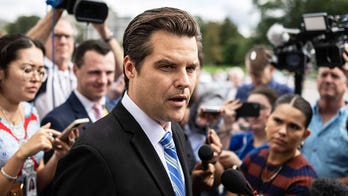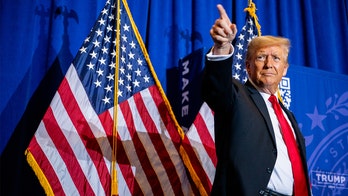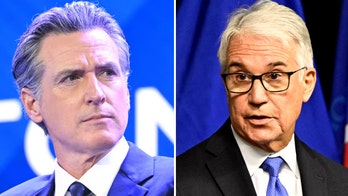Israeli Prime Minister Benjamin Netanyahu on Sunday repeated his assertion that Iran and its “terrorist proxy” Hezbollah are behind the recent suicide attack in Bulgaria and other similar efforts, but avoided commenting on the U.S. presidential race and Mitt Romney’s upcoming visit.
Netanyahu said his assertion that Hezbollah is behind the attack last week at a Bulgarian bus station that killed five Israeli tourists is based on “rock solid” intelligence and its resemblance to other, recent attempted attacks across the world, included an attempt in Cyprus.
“It’s the same modus operandi,” he said on "Fox News Sunday." “It’s them and we know it.”
Netanyahu also called the Iran government “the world’s most dangerous regime.
He is set to meet Saturday with Romney as part of the GOP presidential candidate’s seven-day, international trip to England, Israel and Poland.
The prime minister said only that he would express to Romney the same thoughts that he expressed to President Obama when he was running for the White House in 2008 -- his citizens’ desire for peace and their concerns about Iran having nuclear weapons.
Netanyahu said he agrees with Obama in principal about keeping Iran from having such weapons, but he declined to go further.
“You’re not going to draw me into your politics,” he said.
Still. he pointed out that Iran's nuclear program remains intact four years since the last election.
Iran has defended its nuclear program as peaceful and rebuffed international efforts to dismantle it.
Officials have yet to identify the homicide bomber in Bulgaria, but Netanyahu said his country will share its information with “appropriate” and “friendly” agencies.
“Just imagine what would happened if this regime got a hold of nuclear weapons,” he said on CBS’ “Face the Nation.”
Netanyahu also said he thinks Syrian President Bashar Assad will soon be removed from power, but his bigger concern is what will happen to the country’s stockpile of weapons in the aftermath, “when there is no control.”
The U.S. relationship with Israel, and what to do about Iran's nuclear program, represents one of the starkest contrasts between Obama and Romney.
Romney has not explicitly threatened a U.S. military strike on Iran, if he is elected. But he has suggested he would take a tougher stance than Obama.
"If we re-elect Barack Obama, Iran will have a nuclear weapon. And if you elect Mitt Romney, Iran will not have a nuclear weapon," Romney said last year in a Republican primary debate focused on foreign policy.
Obama rejects the criticism that he has been weak in dealing with Iran, and his aides point to what they call unprecedented U.S.-Israeli security cooperation.
But Netanyahu -- who firmly controls a supermajority in the Israeli parliament and rides high in opinion polls -- has become a complication for Obama.
Their frosty relationship has fueled the perception that U.S.-Israeli relations have deteriorated -- a potential problem for Obama with Jewish voters in the swing state of Florida.
Meanwhile, Romney's relationship with the U.S.-educated Netanyahu dates back decades. Romney and the Israeli leader have a longstanding friendship stemming from their brief overlap in the 1970s at Boston Consulting Group. Both men worked as advisers for the firm early in their careers, before Romney co-founded his own private-equity firm.
Romney's visit to Israel is part of a broader foreign policy trip that includes stops in Britain and Poland. It is widely seen as his opportunity to shore up support among Jewish voters and evangelicals, bolster his credentials on foreign policy and test his prowess on an international stage.
While in Israel, Romney is expected to meet with Netanyahu, U.S. Ambassador Daniel Shapiro and Israeli President Shimon Peres. Romney advisers won't say if he will visit the West Bank, but he does plan a meeting with Salam Fayyad, the Palestinian Authority prime minister.
The trip will be Romney's fourth visit to Israel. He visited in 2011 and gave a speech at the Herzliya Conference in 2007 during which he said Iran's leaders "represent the greatest threat to the world since the fall of the Soviet Union, and before that, Nazi Germany."
The Associated Press contributed to this report.





